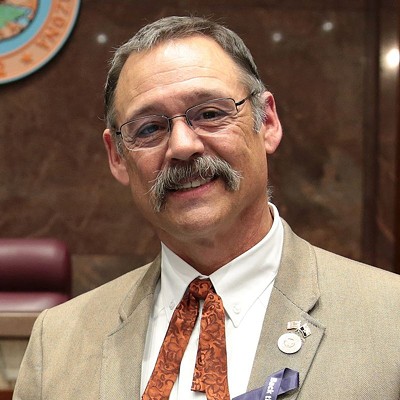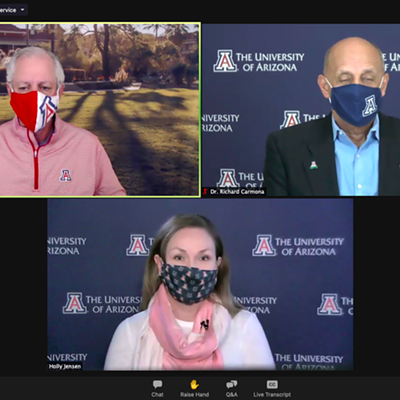After state lawmakers restored funding for transplants earlier this year, Emily Lori Cameron hoped that she would be eligible for a stem-cell transplant that could stop multiple sclerosis from ravaging her body.
But AHCCCS officials rejected her request, calling the operation an experimental procedure.
"I wasn't surprised," says Cameron, 42. "I was really just frustrated and disgusted."
Medicare has agreed to fund 80 percent of the procedure that Cameron needs, and she had hoped that AHCCCS would pick up the tab for the remaining $42,000. (See "AHCCCS Denied," Currents, Dec. 9, 2010.)
But state lawmakers are moving to cut health-care costs wherever they can, with a push to slash AHCCCS spending by more than a half-billion dollars in the upcoming fiscal year.
Unless AHCCCS officials reverse course, Cameron will have to raise the money herself—a task she's already working on. Car-dealer Jim Click has pledged to donate $1,000, as has Tom Chauncey of the Arizona Grantmakers Forum. She's hoping other Arizona car dealers will match Click's donation and is planning a fundraiser at the Loft Cinema sometime in June.
Cameron estimates that she has raised about $9,500 in pledges and can count on the National Transplant Assistance Fund to kick in $5,000, so she still needs to raise roughly $27,500.
The struggle to get the stem-cell transplant is especially frustrating for her, because her twin sister, who was also diagnosed with MS, has undergone the procedure and remains free of symptoms.
MS is a degenerative disease in which the body begins attacking its own nerve cells. Like other victims of MS, Cameron has vision problems, numbness, tingling, pain and trouble keeping her balance.
She fears what her future holds if she can't get the stem-cell transplant.
"To know that you could save yourself but not be able to, and then knowing that you're doomed to life being in a wheelchair, blind, you can't take care of yourself—that's what I'm trying to stop from happening," she says.
The procedure that Cameron needs uses chemotherapy to kill off the body's immune system and then uses stem cells from the patient's own blood to reboot the immune system.
"The studies to date show that it does seem to slow the number of attacks," says Dr. James Bowen, a Seattle-area doctor who has been conducting the procedure on patients with MS. "It does not cure the disease. There are patients who still have attacks and get worse. But remarkably, it slows down the number of attacks for most people."
But the Seattle program that Cameron was hoping to join has already filled up. She still has time to join a similar program in Chicago—but the window is closing there, too.
"I'm on a timeline, and I'm trying to move forward as fast as possible," she says. "If they fill up, there may be another program, but I don't know."
David Hernandez, who received national attention after state lawmakers cut funding for his transplant last year, is once again eligible for a lung transplant—but he's running out of time to find a match.
Hernandez, who has never smoked, is the victim of interstitial lung disease, which is a scarring of the lungs that makes them useless.
"It's a form of suffocation, really," he says. "The more the disease does its work, the less I'm able to breathe."
Hernandez, 48, has felt the progression of the disease in recent months. Around Christmas, he could still go for a mile-long walk with his wife, but today, he's got to keep an oxygen tube under his nose at all times. He gets coughing attacks and struggles to catch his breath. Last week, he was sporting a nasty shiner under his left eye after dizziness led to a recent fall.
Hernandez is now in a waiting game: One day, he hopes to get a call from his doctor letting him know that a matching set of lungs is available. When that happens, he'll need to head to the hospital for the surgery.
He doesn't know if a new set of lungs might have become available during the period when Gov. Jan Brewer and Republican lawmakers cut funding for transplants.
"There could have been a donor," he says. "That's what they tell us at the hospital. There could have been a set of lungs available, but it would've gone somewhere else. You just don't know."
Hernandez says he first noticed he was having trouble when he found himself short of breath on a construction job in 2008, and noticed he had an irregular heartbeat.
"It was a shock that I even had a problem," Hernandez says. "The doctors said, 'You need a transplant.' I said, 'You've got to be kidding.'"
Doctors don't know the cause of the disease, but Hernandez believes it came from breathing in dust on the construction sites where he's worked his entire adult life.
While he's worked in construction, his real passion has been playing music. He took up the guitar as a youngster growing up in San Manuel, and until the disease struck, he played bass in bands around Tucson, including Ritmo Suave and Z Street.
The musical community is coming together to aid Hernandez this weekend with a benefit show at Casino del Sol's AVA Amphitheater. At least a half-dozen different bands, including Steel Ribbon, iMas, Ritmo Suave and the Z Street Band from Tucson, and Rockaddix and V Knights from Phoenix, will be performing from noon to 8 p.m., Saturday, May 28. Proceeds will help cover Hernandez's mounting medical bills and other associated costs.
Despite his troubles, Hernandez tries to stay upbeat.
"You've got to keep a sense of humor, because if you don't, it will drag you to the ground," Hernandez says. "I've got a good family. They're with me."















